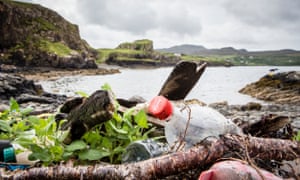https://www.theguardian.com/environment/2018/jan/19/hundreds-of-mps-call-on-supermarkets-to-scrap-plastic-packaging
MPs write to major supermarkets, as pressure grows over the huge amounts of plastic waste they generate
Two hundred cross-party MPs are calling on heads of the major supermarkets to eliminate plastic packaging from their products by 2023.
The MPs, who are from seven political parties, have written to Tesco, Sainsbury’s, Morrisons, Asda, Waitrose, Aldi, Lidl, Budgens and Marks & Spencer urging them to scrap plastic packaging.
They wrote after the Guardian revealed this week the major supermarkets in the UK create more than 800,000 tonnes of plastic packaging waste – well over half the household plastic waste – each year.
Six of the major supermarkets refused to reveal the amount of plastic packaging they put on to the market, saying the information was commercially sensitive. Analysis by Eunomia environmental consultants used figures provided by Aldi and the Co-op – the only chains to release public figures on their plastic tonnage – and the market share of each supermarket to estimate how much plastic packaging the chains produce each year.
This week, Iceland announced it would stop plastic packaging on its own brand products by 2023. Catherine West, Labour MP for Hornsey and Wood Green, who is behind the letter, said: “Vast amounts of plastic are ‘used’ for merely a few seconds before being discarded.
“We have a moral duty to tackle this disposable culture. As such, I welcome the recent announcement from Iceland supermarkets … and I’m delighted that MPs from all parties are supporting my call for other retailers to follow suit.”
Waitrose announced on Friday it would no longer use black plastic for its meat, fish, fruit and vegetables by the end of this year, and that all Waitrose products would be free of black plastic by the end of 2019. Black plastic cannot be recycled under current UK systems.
Each year it is estimated that more than 300m tonnes of plastic are produced globally. The Guardian revealed recently that plastic production is set to soar over the next 10 years.
On Friday Coca-Cola announced a new goal to collect and recycle the equivalent of 100% of the packaging it sells globally by 2030.
Coca-Cola said: “Given the size and scope of this challenge, we expect to invest in new packaging innovations and local collection and recycling systems, as well as consumer education and awareness programs.”
Damian Gammell, CEO of Coca-Cola European Partners, said: “At the heart of this is our commitment to collect 100% of our packaging and ensure that 50% of the PET plastic we use will be rPET by 2025. We are also exploring how we can inspire more consumers to recycle by using the power of our brands, advertising and message on packaging.”
But Greenpeace, which is campaigning for the introduction of a plastic bottle deposit scheme in the UK, said Coca-Cola’s plan failed to include any reduction of the company’s rapidly increasing use of single-use plastic bottles globally, which now stands at well over 110bn annually.
“It contrasts starkly with pledges to reduce the use of disposable plastic made by many retailers in recent weeks,” a Greenpeace spokesman said.
Greenpeace estimates that Coca-Cola has increased its number of single-use plastic bottles by nearly a third (31%) since 2008 and that they now account for almost 70% of Coke’s packaging globally.
Last week, prime minister Theresa May said supermarkets should set up plastic-free aisles, and pledged to eliminate unnecessary plastic waste by 2042 – but received a lukewarm response from environmental groups.
Sue Hayman, shadow environment secretary, said: “Labour is calling on all supermarkets to follow the lead shown by Iceland. We know that the government can act on Britain’s plastics crisis a lot sooner than before 2042.”

沒有留言:
張貼留言